Fashion
Gwyneth Paltrow and Netflix Want to Goop-ify Your Sex Life
Published
3 years agoon
By
Terry Power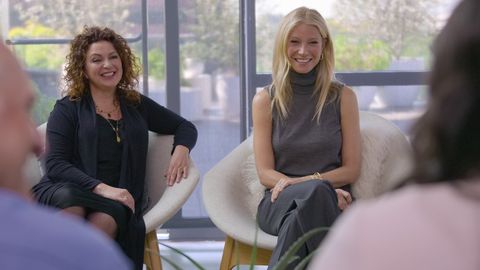
The fact that Gwyneth Paltrow’s next onscreen frontier is a TV show about sex shouldn’t come as a surprise. Her lifestyle, wellness, and self-care brand, goop, has famously sold “vagina-scented” candles and Jade eggs for Kegel-like exercises; a Netflix series on the taboos of intimacy and desire isn’t out of left field.
In fact, the idea sprang from Paltrow and goop’s last project with Netflix, 2020’s The goop lab, which highlights unconventional and boundary-pushing wellness practices, from psychedelics to “vampire facials.” The third episode, focusing on female pleasure, sparked such a conversation that the team thought the topic should be revisited in a deeper format. “I started to think about, wow, why is this one episode such a hot-button issue for people?” Paltrow tells ELLE.com over the phone.
The result is Sex, Love & goop, a six-episode unscripted series now streaming on Netflix, which follows real couples as they’re guided by experts to work on intimacy, communication, body image, and pleasure (for themselves and each other). Methods include taking an intimacy “blueprint” quiz to trying out sex toys (one device resembled wolverine claws) to learning to harness each others’ energies.
Courtesy of NETFLIX
Selected by goop’s editorial team, the experts in the show include Jaiya, a somatic sexologist; Amina Peterson, a sacred sex and intimacy coach; Darshana Avila, an erotic wholeness coach; and Katarina “Kato” Wittich, a Family Constellations facilitator. Michaela Boehm, goop’s go-to expert on intimacy, relationships, and sexuality, joins Paltrow as a co-host. “Michaela I had worked with before in more of a talk therapy capacity, and then she became a friend and a confidant and someone that I really adore and I’m close to,” Paltrow says of her onscreen partner.
Paltrow wasn’t present in person during the couples’ sessions with their experts; “obviously it was a very intimate and private thing,” she says. But she was still impressed with the results. “I was completely blown away by how willing the couples were to, I mean really, lay it out on the line. It’s pretty extraordinary what they went through in the name of each other.”
Here, we catch up with Paltrow about her latest project.
I’d love to start at the beginning. Why did Sex, Love & goop feel like the right next step for you?
I think we wanted to, first of all, try a little bit of a different format. Instead of an anthology where everything was its own kind of siloed show … I guess maybe it was quarantine, like wanting to follow stories on an emotional journey made me want to follow couples through a journey. And so the format was really different because I thought we could explore topics more deeply. I think “The Pleasure Is Ours” episode of The goop lab was a super important, impactful episode for us, and it drove a lot of really interesting conversations around female pleasure. Some people were super uncomfortable, it made some people super happy and, you know, we love a good dialogue here at goop. So I started to think about, wow, why is this one episode such a hot-button issue for people?
And I realized it’s pretty multi-pronged. You have historical patriarchy here that really discounts female pleasure as part of a paradigm. And then you have women being raised and socialized to not ever orient around their pleasure or ask for what they want, for example. At least in my generation, that was not the thing. I also think that your sexuality and your intimate relationships are such a clear microcosm of your life in a way; it’s like the ways you might be lying to yourself, the ways that you’re [em]bracing, the ways you are trying to talk yourself into something—that all comes out in your sex life. I just thought it was a really intuitive next step, [to] dive a little bit deeper into the topic.
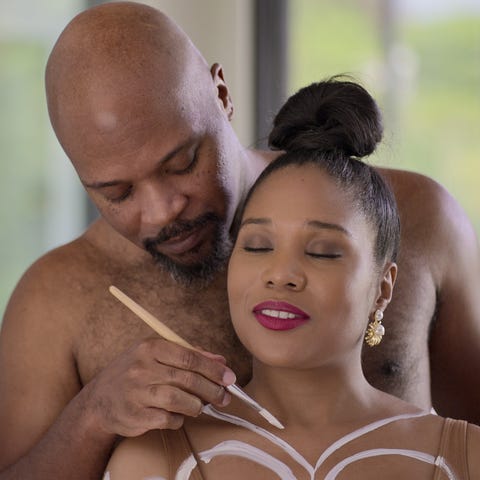
Courtesy of NETFLIX
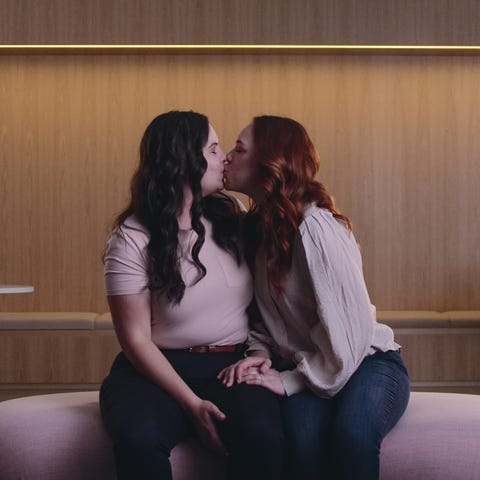
Courtesy of NETFLIX
I saw that you took the blueprint quiz. Were you able to try out some of the methods for yourself and see if they apply to your real life? How hands-on did you get?
I’m saving that all for Christmas vacation, I think. [Laughs] Working. I’m going to bring some Wolverine claws on vacation.
The conversations covered topics beyond the physical aspects of sex, like body image and the pressure on women to look a certain way. What did you take away from those conversations? Did you learn anything about yourself or your own habits?
Yeah, absolutely. I think my biggest takeaway from the whole show is really how important accountability is in your own life. It’s like, it’s so easy for us all to say, you know, “If only he did this,” “If only she did that,” and the idea that we can be really accountable and be really gentle in our way of creating a space to have a conversation like, “Hey, I’m bringing some vulnerability here to ask for this. I’m not blaming you for anything, but I don’t want you to read my mind anymore.” Whether it’s about sex or whether it’s about ways of communication or anything.
It really reinforced to me how critical it is in a relationship to acknowledge what you like, to be in touch with what you’re trying to get out of it, like what is your intention [in a] relationship, and not expecting it to happen or to unfold magically. It’s so up to each of us to cultivate the kind of relationship that we want, and for some reason we’re uncomfortable with that. I felt like, wow, this is such a good reminder to approach my relationship, for example, to continue to always approach it with communication, curiosity, safety, vulnerability, et cetera.
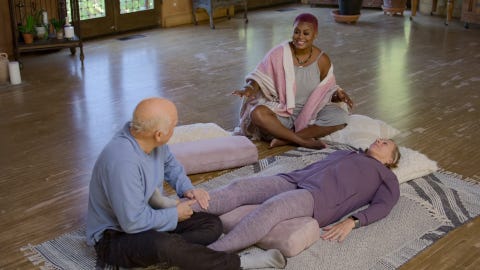
Courtesy of NETFLIX
I felt like as I was watching those conversations, a lot of it came down to communication issues.
Right. And it’s interesting, Jaiya’s work when she talks about [how] people think they have a sexual mismatch, and that’s usually chemical, right? It’s usually just a communication issue. First of all, it’s communication with yourself. Like, “Okay, this is actually something that I like, or that I don’t like, [or] what I need,” and then being able to communicate that freely to a partner.
When the group sat down together, you also touched on marriage and the taboo of it being not so perfect all the time. Why do you feel like it was important to discuss that and include that in the show as well?
Now with social media platforms, people have the opportunity to portray their lives in a very specific way. I’ve heard from a lot of people that the “Instagram marriage” is actually really hard for some people to watch because people are presenting a marriage like this is the most perfect thing in the world: We have no problems. We’re madly in love. We have babies and we have sex all the time. Not that people are in a nefarious way trying to pull wool over people’s eyes, but people tend to post the positive aspects and sometimes the ramifications of that are this paradigm that’s created of what a marriage should look like. That’s just not realistic. And that can make people feel bad about themselves.
Issues come up in marriages from mild to severe. And I always believe that the reason you’re in a long-term relationship is to really heal some part of you. And only that intimate relationship is going to be the thing that kind of surfaces the issue. It’s a great opportunity. So, instead of thinking, “Oh my God, this is a real problem.” It’s like, “Wow, what would happen if we chose a top level of communication about this in a completely different way?” What might be possible? How could we break a paradigm about what a fight looks like, or an uncomfortable conversation looks like?
“The ‘Instagram marriage’ is actually really hard for some people to watch because people are presenting a marriage like this is the most perfect thing in the world.”
Definitely. On that note, what do you hope viewers take away from this show?
I hope that there are really resonant aspects for people, and I think that there will be for everybody. I think there’s some of us in at least one of those characters. If we can honestly help one couple create a template for having a conversation, it’s worth it. I was recording a podcast yesterday and the producer, she had watched the whole thing with her husband and she’s like, “And then all of a sudden we found ourselves, we kept pausing like, ‘Wait a minute, we have never talked about this.’ Or, ‘I want to ask you this question.’” That was like, okay, this producer could be the only person that watches this show and it would be worth it.
Netflix and goop have explored wellness and sex. What would you want to delve into next on screen?
I don’t know. Part of me is like, I want to do another food and travel show. Part of me would love to do, like, a chronic illness documentary. There’s a lot of things that I would love to do. But I’m not sure. We gotta put some thought to it.
This interview has been edited and condensed for clarity.
Erica Gonzales is the Senior Culture Editor at ELLE.com, where she oversees coverage on TV, movies, music, books, and more.
This content is created and maintained by a third party, and imported onto this page to help users provide their email addresses. You may be able to find more information about this and similar content at piano.io
You may like
-
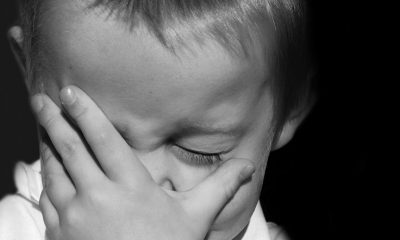

Age Of Autism Diagnosis Has No Impact On Quality of Life, Study Finds
-


Common Nutrient Found In Protein Supplements May Help Add Years To Your Life
-


Alcohol Dependency In Teens Raises Risk Of Depression Later In Life: Study
-


A brain implant changed her life. Then it was removed against her will.
-


Food delivery by drone is just part of daily life in Shenzhen
-
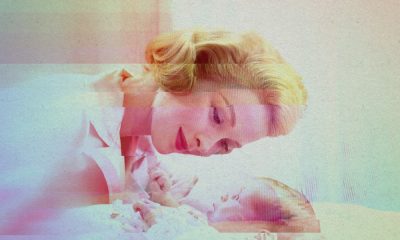

Your digital life isn’t as permanent as you think it is
Fashion
Jennifer Lopez Joined Ben Affleck In L.A. With Kids For Thanksgiving
Published
3 years agoon
26 November 2021By
Terry Power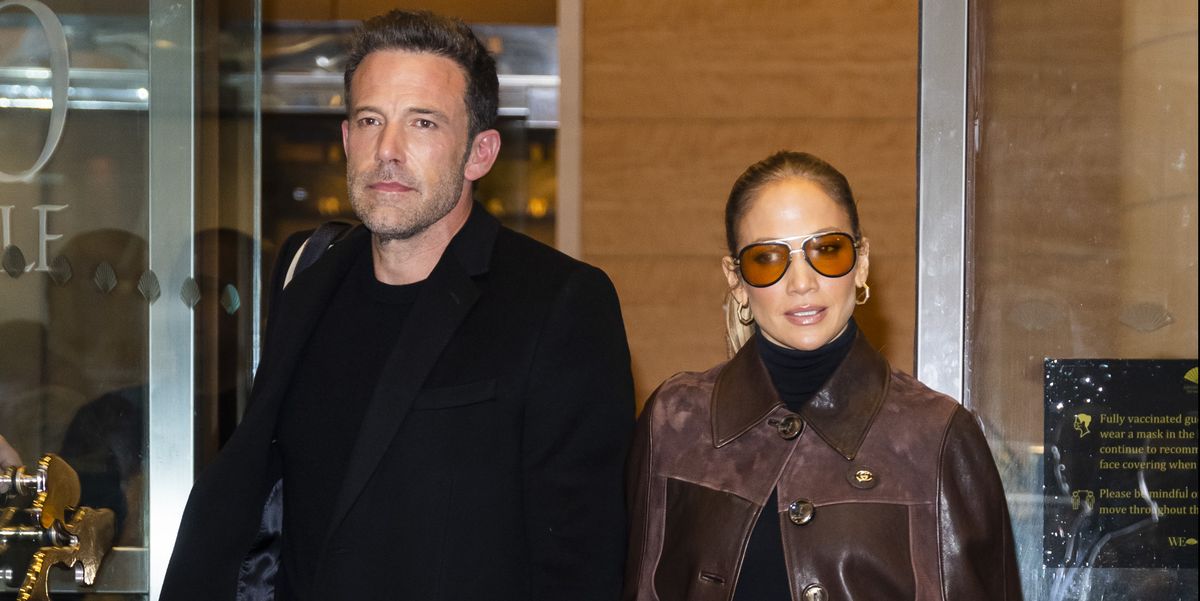
On Wednesday night, Jennifer Lopez arrived in Los Angeles with her 13-year-old twins Max and Emme. The family was likely there to join Lopez’s boyfriend, Ben Affleck, for the Thanksgiving holiday. Lopez recently returned from the much colder climate of British Columbia, Canada, where she was filming her latest project, The Mother.
J. Lo touched down in her private jet wearing a teddy fur coat from Coach’s Autumn/Winter 2019 collection, and a pair of Ugg boots. Classic airplane outfit, celebrity style. Lopez and Affleck originally dated in 2002 and broke up in 2004. Their romance was rekindled earlier this year, soon after Lopez ended her relationship with baseball player Alex Rodriguez. The new couple went official in July, while celebrating Lopez’s 52nd birthday abroad.
Affleck’s most recent relationship with Ana de Armas ended in January after about a year together. He had divorced ex-wife Jennifer Garner in 2015 after being married for almost a decade. Garner and Affleck had three daughters, Violet, Seraphina, and Sam.
Before traveling back to the U.S., Lopez posted a story to Instagram Reels about how grateful she was to be headed home.
“Hey everybody, it’s my last day here shooting on The Mother out in Smithers in the snow, it’s been beautiful, but tonight I’m on my way home,” she said, as she walked through the wild landscape in a black coat and beanie.
“I’m so excited for Thanksgiving! I hope everybody has an amazing weekend with their families and their loved ones, there’s so much to be grateful for this year. I’m on my way!”
This is the first major holiday of the year since Lopez and Affleck reunited, so it’s likely to be a big one for both families.
This content is created and maintained by a third party, and imported onto this page to help users provide their email addresses. You may be able to find more information about this and similar content at piano.io
Fashion
Everlane’s Black Friday Sale is Packed With Winter Essentials
Published
3 years agoon
26 November 2021By
Terry Power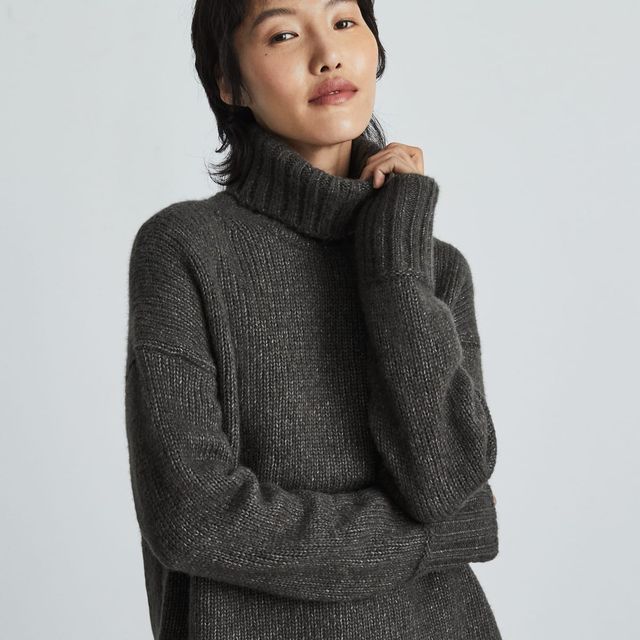
Courtesy
This is not a drill: Everlane just kicked off its Black Friday sale. Now through Monday, November 29, the direct-to-consumer brand is offering 20 to 40% off its cozy sweaters, minimalist activewear, and popular jeans. If you’re not super familiar with Everlane, let me spell it out for you: this is a big deal.
The e-tailer might be known for making sustainable, ethically made clothes and accessories at a fair, affordable price, but Everlane rarely has sales beyond its Choose What You Pay section. So, if you want to stock up on cute basics for less, now’s your time to shop.
And, in true Everlane fashion, the brand is taking this opportunity to give back. Everlane is partnering with Rodale Institute and help U.S. farmers transition their farmland to regenerative organic—and donating $15 per order to the cause. A great sale that gives back? I’m sold.
But, hurry! These deals are going to sell out fast, so you won’t want to waste any time filling your e-cart.
Advertisement – Continue Reading Below
1
The Cloud Turtleneck
$150 $105 (30% off)
Sweater weather is officially here, so why not pick up a few fresh layers? This turtleneck is the S’s: snuggly, stylish, and on sale.
2
The Authentic Stretch High-Rise Skinny Jeans
everlane
$78 $58 (25% off)
Looking for a great pair of jeans, minus the markup? Everlane’s classic skinny style is not only super stretchy, but it’ll look good with everything from chunky sweaters to silky blouses.
3
The ReNew Teddy Slippers
everlane
$65 $39 (40% off)
Why limit the shearling trend to the upper half of your body? These plush slippers will give even your most worn-in sweats a stylish edge.
4
The Chunky Cardigan
everlane
$110 $77 (30% off)
Sure, this may not be the cardigan Taylor Swift was talking about. But, with an exaggerated collar and ribbed finish, this style would definitely score top marks from the singer herself.
5
The Canvas Utility Boots
everlane
$115 $59 (40% off)
Brave the cold weather in style with Everlane’s chic boots. The canvas uppers and thick sole make these an ideal, all-weather option.
6
The Lofty-Knit Henley
everlane
$150 $105 (30% off)
Made with a nubby blend of merino wool, alpaca, and recycled nylon, this henley is perfect for a cozy night in, yet stylish enough to wear in public.
7
The Perform Bike Shorts
everlane
$45 $22 (51% off)
No, you can never have too many stretchy pants. Everlane’s bike shorts ooze major Lady Di vibes — for under $25, no less.
8
The ReLeather Court Sneakers
everlane
$110 $66 (40% off)
Made with recycled leather, these refresh sneakers will serve up major curb appeal — and Mother Nature’s seal of approval.
9
The Field Dress
everlane
$100 $60 (40% off)
Found: a fun, flouncy frock you can wear year-round. For a wintry take, pair with opaque tights and your favorite chunky boots.
10
The Cozy-Stretch Wide-Leg Sweatpants
everlane
$150 $75 (50% off)
With a straight-legged silhouette and wool material, it’s safe to say these are the chicest sweatpants we’ve ever seen. To sweeten an already enticing offer, this pair is half off.
11
The Organic Cotton Flannel Popover
$80 $56 (30% off)
Everlane reimagined the traditional flannel with a cropped silhouette, voluminous sleeves, and a slew of minimalist colors.
12
The Studio Bag
everlane
$275 $192 (30% off)
Large enough to fit all your essentials, but not too big that it’ll weigh you down, Everlane’s Studio Bag is the perfect everyday purse.
13
The ReNew Long Liner
everlane
$158 $118 (25% off)
House Stark was right: winter really is coming. Made with recycled materials, this liner is a great layering piece that’s considerably chicer than the yesteryear’s Michelin Man-worthy parkas.
14
The Felted Merino Beanie
everlane
$50 $30 (40% off)
All set on clothes? Pick up this cheery beanie, which is 40% off its original price.
Kelsey Mulvey is a freelance lifestyle journalist, who covers shopping and deals for Marie Claire, Women’s Health, and Men’s Health, among others.
This content is created and maintained by a third party, and imported onto this page to help users provide their email addresses. You may be able to find more information about this and similar content at piano.io
Advertisement – Continue Reading Below
Fashion
29 Winter Fragrances That Exude Main Character Energy
Published
3 years agoon
26 November 2021By
Terry Power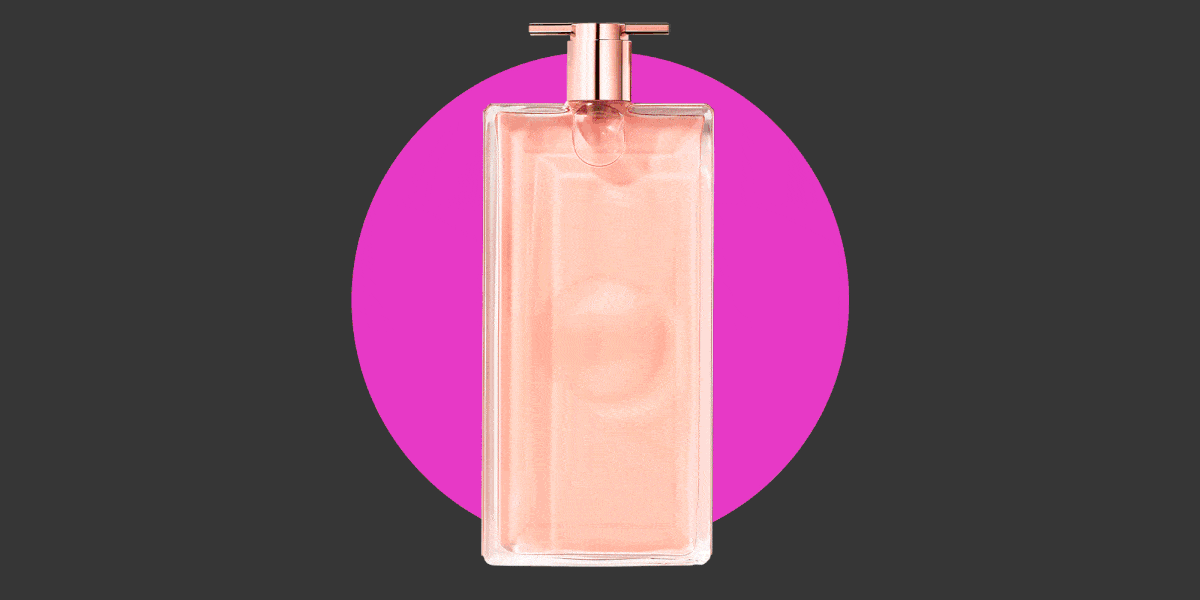
29 Winter Fragrances That Exude Main Character Energy
